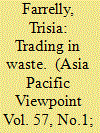| Srl | Item |
| 1 |
ID:
136141


|
|
|
|
|
| Summary/Abstract |
Talanoa has been defined as ‘talking about nothing in particular’, ‘chat’ or ‘gossip’. It is within the cultural milieu of talanoa that knowledge and emotions are shared and new knowledge is generated. Talanoa has recently been taken up by development researchers and others as a culturally appropriate research method in Pacific contexts. However, talanoa is often treated as synonymous with ‘informal open-ended interviews’ and tends to gloss over the deep empathic understanding required in such exchanges. Highlighting the connection between talanoa and empathy is vital in ensuring that development practitioners and researchers are implicitly aware of the political dimensions, cultural appropriacy and socio-ecological impact of their research methods. This connection is also critical in illuminating how talanoa as a method may decolonise research in the Pacific, inform the decolonisation of research in other cultural contexts, and contribute to ethical and empowering development policy and practice. We will argue for the merits of what we refer to here as ‘empathic apprenticeship’: an intentional, embodied, emotional, and intersubjective methodology and process between the researcher and the participant. An empathic apprenticeship has the potential to enhance shared understandings between all human beings and is essential if talanoa is intended as a decolonising research methodology.
|
|
|
|
|
|
|
|
|
|
|
|
|
|
|
|
| 2 |
ID:
144843


|
|
|
|
|
| Summary/Abstract |
This paper provides a broad survey of existing literature on contemporary solid waste management (SWM) in the Pacific region to underscore an urgent and compelling need for improved SWM. Despite advances in waste management systems and funding for technical support and capacity building from a range of sources, waste continues to threaten public and ecological health and the economy in Pacific Islands Countries and Territories (PICTs). SWM in the Pacific requires innovative thinking in a challenging environment of remoteness, limited available land, fragile ecosystems, vulnerability to natural hazards and subsequent climate sensitivity. Many PICTs are under considerable pressure to open their markets up to trade liberalisation. Increasing links to the global economy through trade liberalisation could either further exacerbate waste management challenges in the Pacific or contribute to environmental protection and sustainable development goals. The authors argue that if the PICTs' urgent waste management challenges are to be meaningfully addressed, the region's leaders must ensure trading partners conform to local environmental protection policies and that trade agreements align with sustainable development goals.
|
|
|
|
|
|
|
|
|
|
|
|
|
|
|
|